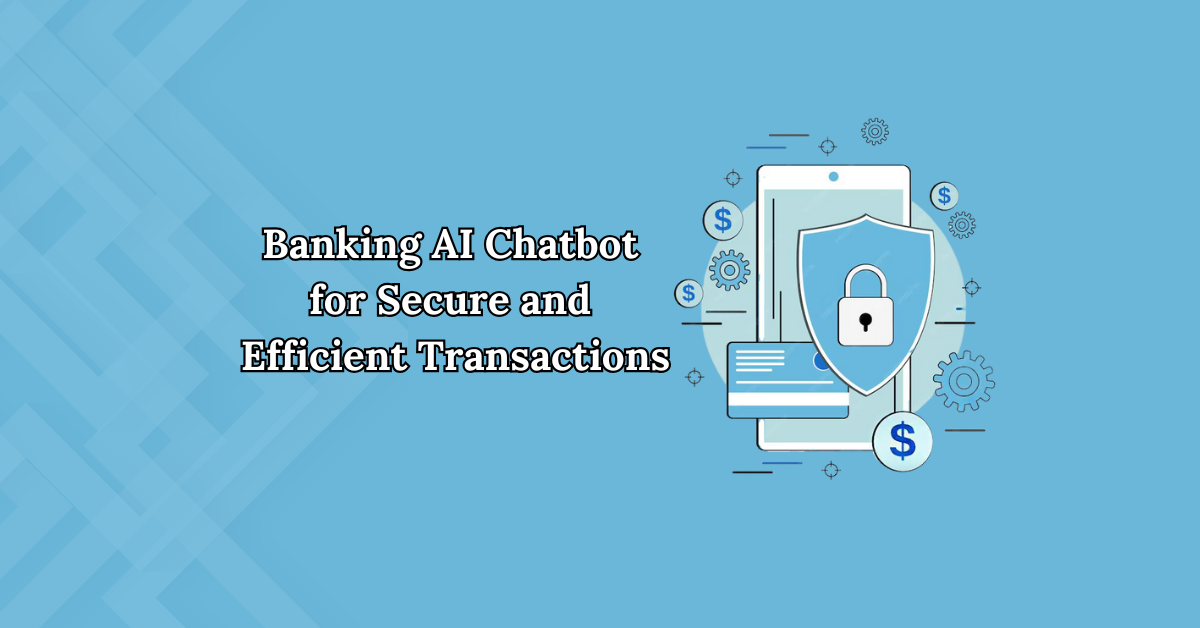AI chatbots are transforming the global corporate environment by automating consumer interactions, increasing user experience, and streamlining operations in multiple industries.
As the banking industry adopts digital transformation, AI chatbots are becoming very effective tools for ensuring secure and efficient transactions.
These are the two most significant factors influencing customer happiness and trust. Consumers demand quick, seamless service that protects their sensitive information.
To meet these expectations, AI chatbots are critical as they change the banking experience by handling inquiries and real-time transaction processing, ensuring that clients receive the best service while maintaining the utmost security.
What is a banking AI chatbot?
A banking AI chatbot is a virtual assistant that uses artificial intelligence to engage with consumers and deliver banking services and assistance. It can answer questions, execute transactions, provide financial advice, and monitor account security.
AI Chatbot Adoption in the Banking Industry
AI chatbots are gaining popularity in banks because they can assist customers quickly and effectively. Banks use chatbots to do simple tasks such as checking balances and transferring money. This allows people to focus on more vital issues. Chatbots are becoming smarter, able to master various languages, recognize patterns, and guess what clients want. This enables banks to deliver better service while staying a step ahead.
Key Reasons Why Banks Are Turning to AI for Customer Interactions
- 24/7 Availability
Banks are increasingly using AI chatbots because they can provide 24/7 customer service. AI assures that clients get help when they want it. This constant availability improves customer satisfaction and enables banks to serve a global audience across different time zones.
- Enhanced Security
Security is pivotal in the financial sector, and AI chatbots are fitted with advanced safety features to guard sensitive customer information. Chatbots help to ensure the security of transactions by encrypting, authenticating, and detecting fraud in real time. The focus on security helps gain client trust by informing them that their financial information is secure.
- Cost Efficiency
AI chatbots provide significant cost benefits for banks by eliminating the need for customer service teams. By automating common inquiries and procedures, banks can save operational expenses while maintaining a high standard of service.
- Improved customer experience.
AI chatbots optimize the customer experience by providing immediate, genuine, and personalized responses. They can respond to a wide range of consumer inquiries, from simple requests to more complicated transactions, all within seconds.
- Scalability
AI chatbots can manage a larger volume of queries. This scalability ensures that all clients receive immediate help, even during peak traffic periods, without affecting service quality.
- Regulatory Compliance
AI chatbots assist banks in remaining compliant with rules by monitoring transactions and ensuring appropriate checks are in place, lowering the risk of penalties.
Enhancing Transaction Security
In the world of banking, AI chatbots play an important role in protecting consumer transactions by using strong computations to verify that each transaction is secure, giving users peace when managing their accounts online.
AI chatbots use algorithms to monitor and secure transactions. These algorithms can filter huge quantities of data and detect unusual patterns or actions that indicate fraud. For example, if a transaction differs from a customer’s usual spending pattern, the chatbot reports it for further assessment or requests further verification. This approach helps to prevent acts of fraud and assures security.
Features Like Encryption, Authentication, and Fraud Detection
Encryption: Protecting Sensitive Data
- Advanced Encryption Algorithms: AI chatbots use advanced encryption techniques such as AES (Advanced Encryption Standard) to protect sensitive information during transmission and processing.
- Data security during Transit and at Rest: When a customer provides confidential data, such as bank account numbers or personal credentials, it is immediately encrypted. This encryption is maintained throughout transmission and when kept on the bank’s computers.
- Protection Against Unauthorized Access: Even if hackers intercept the data, encryption assures that it is inaccessible without the decryption key, significantly enhancing data security.
Authentication:
- Multi-Factor Authentication (MFA): AI chatbots use multi-factor authentication (MFA) to confirm a user’s identity, requiring various forms of identification before giving access to accounts. This strategy significantly decreases the possibility of unauthorized access.
- Layered Security Measures: For instance, after providing a username and password, a user may be sent a one-time passcode (OTP) to their registered mobile device to complete their login. This assures that even if a password has been stolen, the attacker will still require the second factor of authentication.
- Biometric Verification: AI chatbots can enable advanced authentication methods such as fingerprint scanning, facial recognition, and voice recognition. These solutions, which use unique personal IDs, add a further level of security.
Fraud Detection:
- Transaction Monitoring: AI chatbots have strong fraud detection skills, allowing them to monitor transactions. They examine transaction data and user behavior patterns to detect any odd activity.
- Identifying and Responding to Unusual Behavior: For instance, if a consumer who usually shops locally suddenly makes a significant transaction from far away, the chatbot might recognize it as suspicious. It will automatically pause the transaction and notify the customer for verification.
- Adaptive Learning: As AI chatbots learn from fresh data and experiences, they become more successful at detecting and preventing illegal actions.
- Building customer Trust: By offering real-time monitoring and quick actions to potential threats, AI chatbots assist to create and maintain client trust in the bank’s digital services, ensuring that their accounts are always secure.
Conclusion
The future of AI chatbots in banking promises to bring incomparable levels of security and efficiency to the business. As technology advances, AI chatbots will not only execute harder jobs but will also provide increased security by securing customer’s information and financial transactions with cutting-edge encryption, biometric authentication, and real-time fraud detection. These advancements will enable banks to provide faster, more dependable, and secure services, fulfilling consumers’ increasing expectations while staying ahead of emerging risks.
Efficiency will also skyrocket as AI chatbots become more integrated with banking systems, automating regular activities and expediting complex operations. This will result in faster transactions, shorter wait times, and a more streamlined consumer experience overall. In a fast-changing digital market, AI chatbots will be critical tools for banks seeking to maintain their market position by providing both the security and efficiency that clients demand.


Leave a Reply